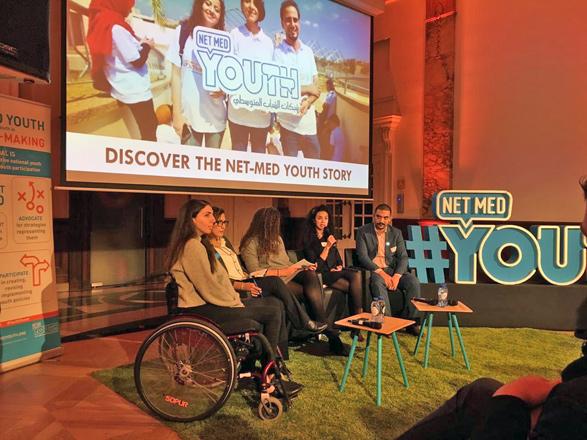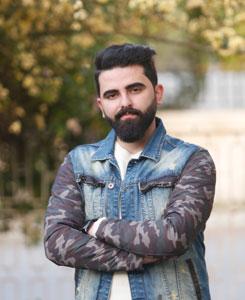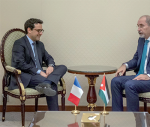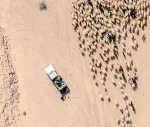You are here
Youth ambassadors solve local issues through café talks, debates, online sources
By Camille Dupire - Aug 28,2018 - Last updated at Aug 28,2018
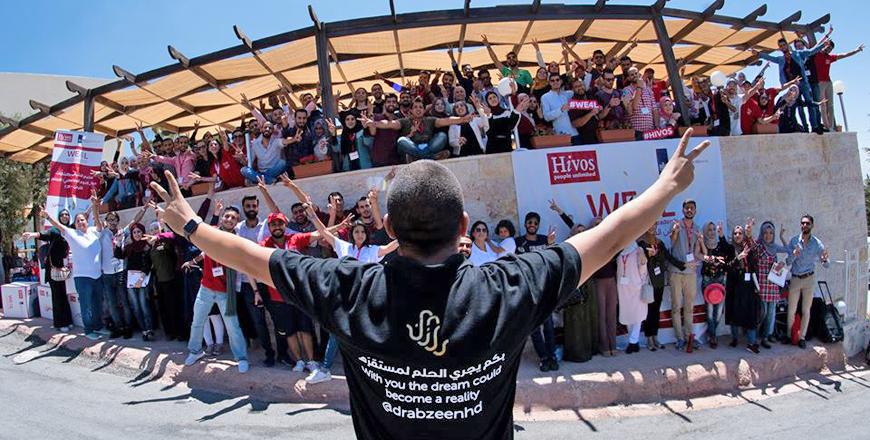
Local organisation Drabzeen for Human Development provides a forum for youth across the Kingdom to promote good governance, human rights, among others (Photo courtesy of Drabzeen Facebook page)
AMMAN — Offering Jordan’s youth a steady hand to hold onto during difficult times was the vision Anas Alrawashdeh wanted to achieve when he co-founded “Drabzeen for Human Development” in 2012, aiming to support youth, gender and community initiatives.
Reaching out to the youth
The name Dbrabzeen (or “railing” in Arabic) embodies the local organisation’s goal to act as a “hand rail” for youth, 30-year-old Alrawashdeh said, noting that the organisation carries out a wide variety of programmes that range from promoting good governance, human rights and the rehabilitation of the Jordanian labour market; implementing initiatives to support the rule of law, media and technology as well as awareness of health and environmental issues, in addition to fundraising for small economic projects.
“Drabzeen has established 20 volunteer clubs across all governorates, each made up of a host of youth ambassadors, with around 2,500 active ambassadors throughout the Kingdom,” Alrawashdeh explained, noting that these ambassadors strive to provide a forum for young Jordanians to discuss human rights, democracy and political participation through café talks, debating workshops and online resources.
Supported by UNESCO with funding from the European Union, the organisation is part of the Networks for Mediterranean Youth project, which aims to improve access and effective participation of young people in national planning and policies in Southern Mediterranean countries, according to its website.
“In Jordan, the project works towards enhancing the effective participation of youth in developing and implementing national strategies and policies affecting youth through increasing their access to relevant information and resources,” a UNESCO statement sent to The Jordan Times said, adding “in achieving that goal, it strives to reduce the fragmentation of efforts and to harness the collective potential of youth in affecting democratic transition towards active citizenship, political participation, economic development and social inclusion.”
Uniting efforts
Being part of this project has meant a lot for Drabzeen, as it gave its members the opportunity to be one of the 60 national organisations selected to be part of the first “National Youth Organisations Coalition, out of 1,000 applicants.
“The coalition provides a staging ground for making good connections and fusing partnerships across governorates,” Alrawashdeh remarked, adding that “the training we have received has been so valuable and we have even learned about how to broaden our youth networks beyond Jordan. This type of networking is a relatively new concept for us”.
The coalition, launched at the end of last year by UNESCO and the Jordanian Hashemite Fund for Human Development, aims to create “an enabling environment in which young men and women can develop their competencies, exercise their rights and meaningfully engage in their communities as active citizens”, the UNESCO statement said.
As part of it, Alrawashdeh recently travelled to Tunisia for the OECD “Youth Participation in Local Governance” summit, where he gained insight into the tools designed to foster increased participation at the local level and heard about various success stories and challenges from national and local councils.
“I was so grateful to have been part of this important event. We were able to meet with the youth council for Europe and MENA and it was enlightening to hear about the experience of European youth, their strategies for expanding their networks and engaging youth in public issues," the young co-founder explained, stressing "the emphasis on Sustainable Development Goal 16, which focuses on promoting peaceful and inclusive societies, providing access to justice to all and building inclusive institutions, really spoke to me as I can see how important the achievement of this goal is in my home country of Jordan”.
Tackling tricky challenges through dialogue
But Drabzeen's mission to help realise the UN 2030 Agenda for Sustainable Development is not exempt from challenges, as the youth ambassadors face very tough issues to address sometimes.
Recently in Karak, 140km south of Amman, the ambassadors had to support the mitigation of a tribal dispute, whereby a man who had killed a local, and all those associated with him, had been expelled from their village.
"In cases like this, there is often no justice for the victims and the cycle repeats itself,” Alrawashdeh underlined.
To break this "cycle" and provide fruitful support, the ambassadors therefore worked with locals using Drabzeen's three-step plan. First, they raised awareness through social media and local radio, hosting 10 radio episodes to discuss the resolution of the tribal issue. They then gathered the leaders and youth of the concerned tribes to discuss the larger issue of tribal justice, developing together a mutually acceptable agreement for the best way forward.
Finally, the ambassadors worked to train Karak youth on the rule of law, as Alrawashdeh stressed how important it is "to engage youth in the solution".
Drabzeen also recently conducted Abshiri, a project aimed at strengthening women’s representation, participation, rights and leadership position across the Kingdom, by connecting grassroots work with local communities through live Facebook feeds.
Related Articles
AMMAN — Two young Jordanians recently “inspired their peers” at a UNESCO event in Brussels when they presented their social development init
AMMAN — Hamza Al Hassan, 26, a graduate of the Yarmouk University’s Faculty of Mass Communications feels that there is room for media and in
AMMAN — Some 100 youth and partners on Sunday gathered at the King Hussein Club, to share their personal experiences in the field of media a


